Simvotin 20
Simvotin 20 is classified as a statin (or HMG-CoA reductase inhibitor) medication. It helps reduce levels of bad cholesterol (LDL) and triglycerides. Consequently, it reduces the likelihood of a subsequent heart attack or stroke. Two forms of cholesterol exist in human bodies: good cholesterol (high-density lipoprotein) and bad cholesterol (low-density lipoprotein) (low-density lipoprotein). Good cholesterol is good to the heart and aids in the lowering of bad cholesterol. In contrast, excessive LDL cholesterol increases the risk of cardiac disease, such as heart attack and stroke. Hyperlipidemia or dyslipidemia refers to a condition in which there is an abnormally high level of cholesterol in the blood. When your blood cholesterol levels are excessive, your arteries constrict and become clogged, which can lead to cardiovascular issues such as stroke and heart attack. High cholesterol is induced by consuming high-cholesterol or high-fat meals and beverages, as well as genetic factors.
Simvotin 20 inhibits liver enzymes, hence decreasing the formation of cholesterol in the liver. Simvotin 20 enhances the liver’s uptake and breakdown of blood cholesterol. Simvotin 20 reduces the levels of lipids known as cholesterol and triglycerides in the blood when lifestyle modifications (such as a low-fat diet) have failed. By blocking the synthesis of “bad” cholesterol in the body, Simvotin 20 reduces “bad” cholesterol and boosts “good” cholesterol. It also enhances the body’s ability to eliminate the substance.
Simvotin 20 should be taken precisely as prescribed by a physician. Depending on the severity of your medical condition, you should take Simvotin 20 for as long as your doctor prescribes. Possible adverse effects include constipation, upper respiratory infection, headache, and abdominal pain. The majority of Simvotin 20’s adverse effects do not necessitate medical treatment and diminish over time. However, if the bad effects persist, visit a physician.
This drug is only one component of a comprehensive treatment strategy that also includes a low-fat diet, regular exercise, cessation of smoking, moderate alcohol use, and weight loss. You can eat normally while taking this drug, however you should avoid high-fat foods. Inform your doctor if you have liver illness, jaundice, hepatitis, diabetes, or a musculoskeletal disorder before beginning treatment with Simvotin 20 Tablet 10’s. If you are pregnant or nursing, you should not take Simvotin 20.
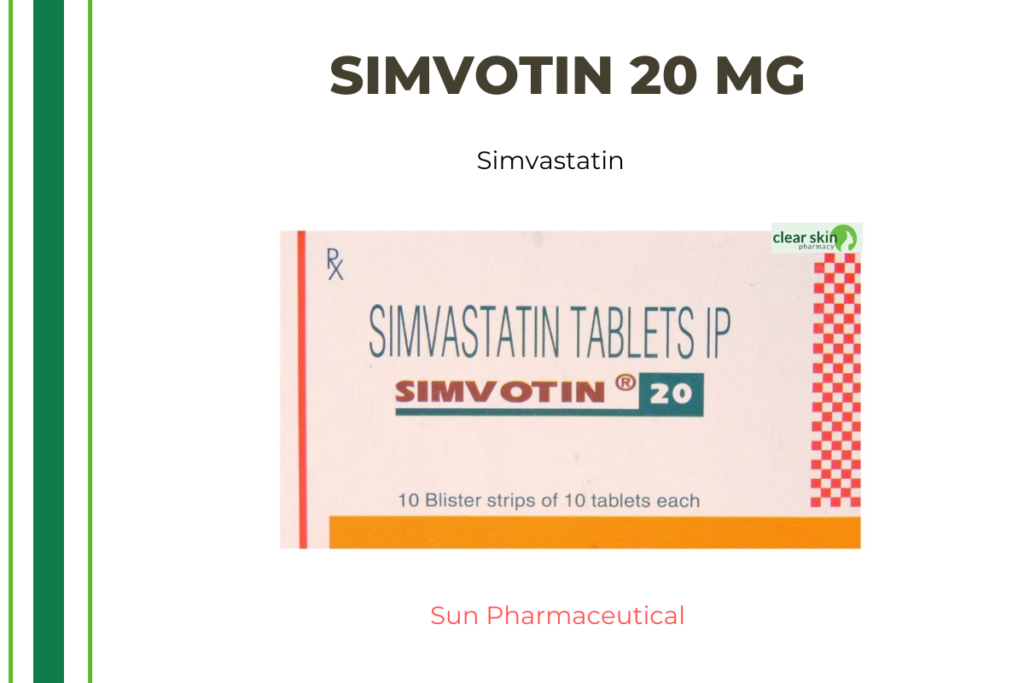
Simvotin 20’s Applications
Hyperlipidemia (high cholesterol), heart attack prevention, and stroke prevention
Medicinal Advantages
Simvotin 20 decreases the risk of cardiovascular disease and coronary events, including heart attacks, strokes, and heart-related chest pain (angina). Simvotin 20 assists individuals with a high risk for unfavorable consequences. Simvotin 20 inhibits liver enzymes, hence decreasing the formation of cholesterol in the liver. Simvotin 20 enhances the liver’s uptake and breakdown of blood cholesterol. Simvotin 20 reduces the levels of lipids known as cholesterol and triglycerides in the blood when lifestyle modifications (such as a low-fat diet) have failed. By blocking the synthesis of “bad” cholesterol in the body, Simvotin 20 reduces “bad” cholesterol and boosts “good” cholesterol. It also enhances the body’s ability to eliminate the substance. Simvotin 20 inhibits the advancement of atherosclerosis in adult patients (blocked artery walls of the heart caused by fat/lipid deposition, which can lead to heart attack and stroke).
Use Instructions
Simvotin 20 should be administered orally with water. Take Simvotin 20 according to your doctor’s instructions, with or without food. It is advisable to take it at a particular time.
Place in a cool, dry area out of direct sunlight.
Simvotin 20 Side Effects
The majority of Simvotin 20’s negative effects do not necessitate medical attention and diminish over time. However, if the bad effects persist, visit a physician. Constipation, upper respiratory tract infection, headache, and abdominal pain are all frequent adverse effects of Simvotin 20. The above side effects are not necessary for all patients. Consult your physician if you have any discomfort.
Drug Recommendations
If you are allergic to any of Simvastatin’s constituents, you should not take the drug. Inform your doctor if you have liver disease, jaundice, hepatitis, diabetes, or a musculoskeletal disorder prior to using Simvastatin. Long-term usage of simvastatin can cause myopathy, rhabdomyolysis, and renal impairment. If you take Simvastatin on a daily basis, you should undergo routine liver enzyme testing. A person with liver illness who consumes excessive amounts of alcohol should get medical counsel before ingesting it. If you are pregnant or nursing, you should not take this Simvastatin.
Interactions Between Drugs
Simvastatin is known to interact with cyclosporine (organ transplant medication), warfarin or clopidogrel (blood thinners), fibrates (gemfibrozil, fenofibrate), erythromycin, fusidic acid (antibiotic), oral contraceptive pills, regorafenib (anti-cancer medication), anti-fungal (itraconazole, ketoconazole) and anti-viral (itraconazole (like ritonavir, lopinavir, atazanavir, simeprevir, ombitasvir, paritaprevir, dasabuvir, velpatasvir, grazoprevir, elbasvir, glecaprevir, pibrentasvir). The action of simvastatin may be changed by these medications.
Simvastatin should not be taken with alcoholic beverages, per drug-food interactions.
Drug-Illness Interactions: Use Simvastatin with caution if you have renal disease, liver disease, or diabetes.
Safety Suggestions
ALCOHOL
To avoid unpleasant side effects such as lethargy, dizziness, and exhaustion, you should avoid alcohol when taking Simvastatin. Combining it with excessive amounts of alcohol can result in a life-threatening condition known as coma.
PREGNANCY
Because simvastatin has the potential to harm a fetus, your doctor will weigh the benefits against the risks before prescribing medication to you.
BREAST FEEDING
Simvastatin appears not to pass into breast milk. It is not advised to breastfeed while taking Simvastatin due to the risk of damage to the infant. Before beginning breastfeeding, consult your physician.
DRIVING
Typically, Simvastatin has little effect on driving ability.
LIVER
Simvastatin should be administered with caution in patients having a history of liver issues or abnormalities. Your physician may need to adjust the dosage.
KIDNEY
Simvastatin should be administered with caution, particularly in patients with a history of kidney disease. Your physician may need to adjust the dosage.
No habit formation
Advice on Diet and Lifestyle
With a BMI between 19.5-24.9, it is possible to maintain a healthy weight.
Perform at least 150 minutes of regular physical activity or exercise every week, or around 30 minutes daily. This can help you reduce your high blood pressure by around 5 mm Hg.
It is advisable to consume a diet rich in whole grains, fruits, vegetables, and low-fat dairy products.
Optimal sodium chloride (table salt) intake for most persons is 2300 mg per day or less than 1500 mg per day.
Limit your alcohol consumption to one serving for women and two serves for men.
Stopping smoking is the best method to minimize your risk of heart disease.
Chronic stress can elevate blood pressure, therefore you should avoid it. Spending time with and appreciating your loved ones is a stress-reduction and mindfulness approach.
Monitor your blood pressure daily, and if it swings excessively, contact your physician immediately.
Include omega 3 fatty acid-rich foods and beverages in your diet on a daily basis. You can also use low-fat cooking oils such as olive oil, soybean oil, canola oil, and coconut oil to lower your blood pressure.
Other details: This item is non-refundable.
Glossary of Diseases and Conditions
Two forms of cholesterol exist in human bodies: good cholesterol (high-density lipoprotein) and bad cholesterol (low-density lipoprotein) (low-density lipoprotein). Good cholesterol is good to the heart and aids in the lowering of bad cholesterol. In contrast, excessive LDL cholesterol increases the risk of cardiac disease, such as heart attack and stroke. Hyperlipidemia or dyslipidemia refers to a condition in which there is an abnormally high level of cholesterol in the blood. When your blood cholesterol levels are excessive, your arteries constrict and become clogged, which can lead to cardiovascular issues such as stroke and heart attack. High cholesterol is induced by consuming high-cholesterol or high-fat meals and beverages, as well as genetic factors.
FAQs
The combination of simvastatin and fusidic acid should be avoided since it can induce muscle weakness, discomfort, and pain. Consult your physician before taking Simvastatin and fusidic acid together.
Even if you are feeling better, you should not stop taking simvastatin, as doing so will worsen your condition. Please see your doctor and follow his or her directions if you feel better.
Muscle aches and pains may be induced by simvastatin, especially if you are ill or have a fever. In addition, if you experience persistent muscle weakness, you should contact your physician.
Typically, simvastatin is administered once day, after dinner, in the evening. Try taking Simvastatin at the same time every day to determine when to administer it.
Simvastatin is a medication that reduces blood cholesterol levels. For optimal Simvastatin results, you should avoid high-calorie items like as junk food and fried foods. A diet reduced in cholesterol and fat is recommended. Be sure to adhere to your dietician’s or physician’s dietary and exercise recommendations.

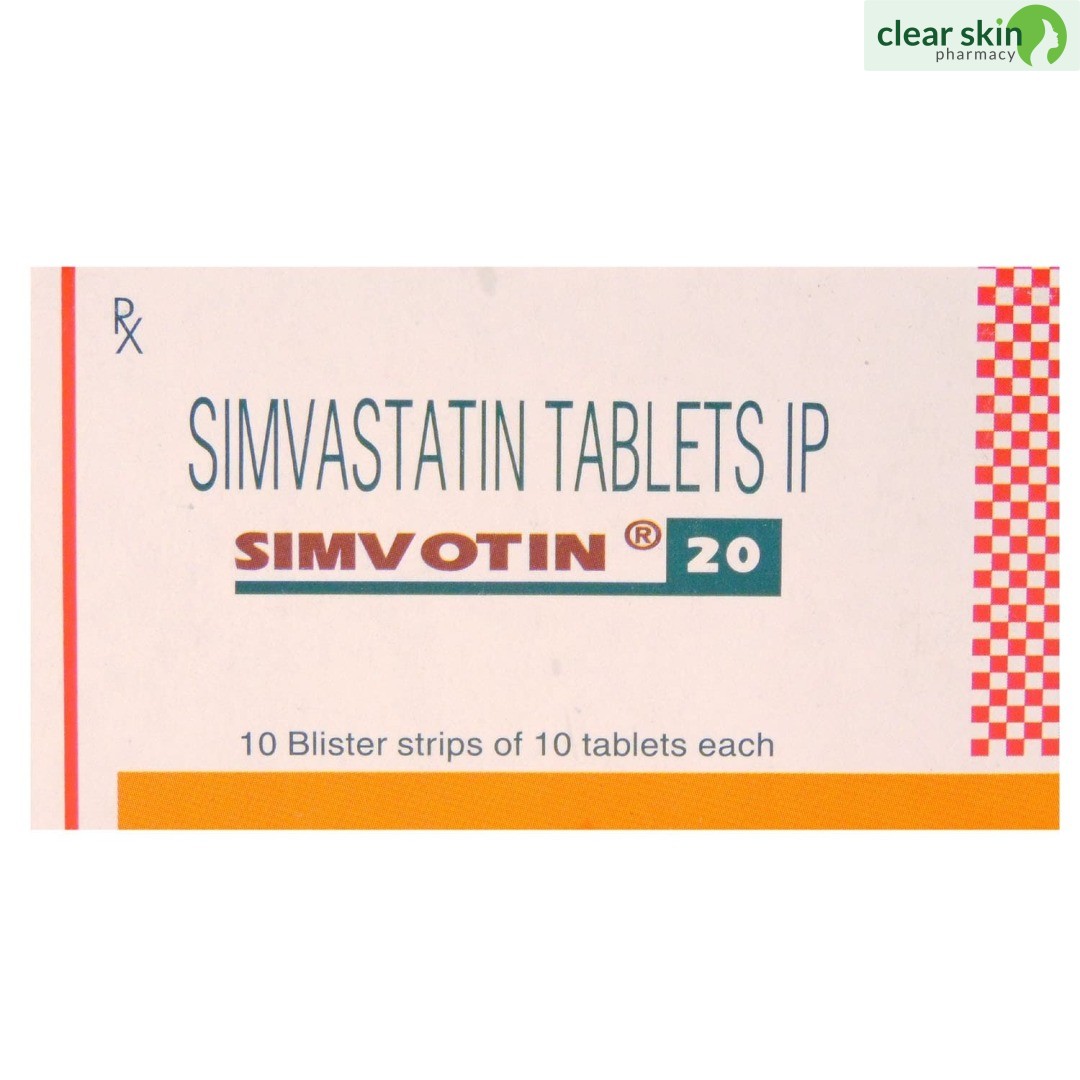

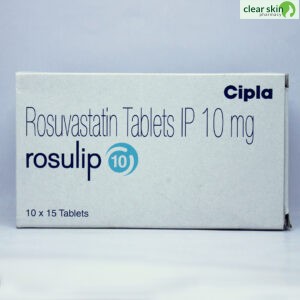
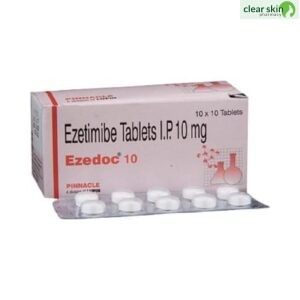

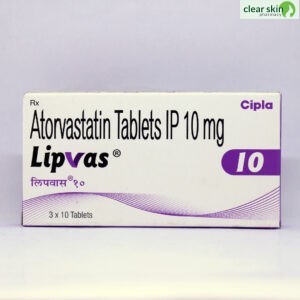

Be the first to review “SIMVOTIN 20 MG 10 Tablets”